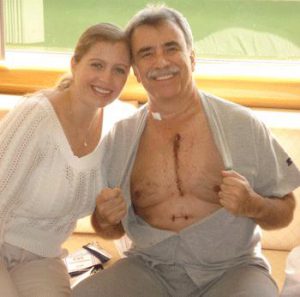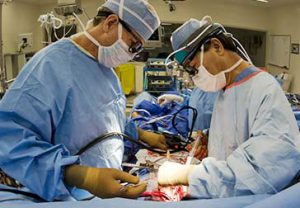What is it?
Your heart contains valves which regulate the way blood flows through it. There are several conditions which can result in dysfunction of one or more of these valves. If the valve function is bad enough, it may need to be repaired or replaced.
Why is it necessary?
Your heart contains four major valves. One or more of these valves may become damaged whereby it either leaks, causing blood to flow in the wrong direction, or becomes very narrow, making it difficult for blood to flow through it. In some cases, the valve may be repaired. In other cases, it must be replaced with a valve made of animal material (i.e., pig or cow) or metal.
How is it done?
During cardiac valve repair or replacement surgery, your breastbone is divided in half to expose your heart. Your heart is then connected to a heart-lung machine which completely takes over the function of your heart and lungs, permitting the surgeon to temporarily stop your heart. A portion of your heart is then open, exposing the malfunctioning valve and the surgeon repairs or replaces it. Once the valve is fixed, the heart is closed. Your heart is then allowed to resume beating, it is disconnected from the heart-lung machine, and your breastbone is closed with wires. The operation usually takes from three to five hours.
What should you expect?
Before the procedure:
· You must not take any drugs containing aspirin for two weeks before the surgery. These drugs may cause you to bleed more than normal.
· You must stop smoking. People who smoke have more mucous in their lungs, which is hard to remove after surgery.
· You will need to find someone to stay with you after you get home from the hospital. You may hire a home health aide, but their services can be costly.
· You may need blood while you are in the hospital. If you would like to donate your own blood, please tell you doctor.
· You may not eat or drink anything after midnight the night before the surgery. You may take your normal pills with a small sip of water. If you are diabetic, check with your doctor about your diabetic medicines.
· You will need a chest X-ray, a urine test, and EKG of your heart and blood tests before surgery. These tests may be done at an outside facility or in the hospital the day before surgery.
· The day before surgery, you will need to scrub your abdomen and legs several times with a special soap to kill germs. (This recommendation may change over time).
· If you will be in the hospital before the day of the surgery, please bring all the pills you take with you to the hospital and show them to the nurse.
· Do not bring valuables, such as jewelry or money, with you to the hospital.
· Your doctor will explain the surgery to you and ask you to sign a consent form.
· You may meet other members of the heart team, such as the anesthesiologist, the doctor who will give you drugs to put you to sleep for the surgery.
During the procedure:
· You will be asked to remove all dentures and non-permanent bridgework, hair clips, jewelry and nail polish before going in to surgery.
· The morning of the surgery, your chest will be shaved.
· Your nurse will start an IV in your arm to give you fluids. You may also receive drugs to help you relax and you may have a face-mask to breathe oxygen.
· You will be asked to go to the bathroom five to ten minutes before the surgery. During and immediately after the surgery, you will have a small tube in your bladder to drain urine.
· The operating room may be cool, but you may have a blanket if you wish.
· You will receive drugs to put you to sleep and to block pain. You will not be awake during the surgery.
· The surgeon then will divide the breastbone and spread the ribs to get to the heart. The heart-lung machine will take over the work of your heart and lungs.
· Depending on your surgery, the surgeon will repair or replace your heart valve.
· Once the work is done, the surgeon will start your heart and turn off the heart-lung machine.
· Your breastbone will be wired shut and your wound will be closed with stitches or staples.
After the procedure:

· You will be taken to the CICU (Cardiac Intensive Care Unit) after surgery.
· You will have a breathing tube in your windpipe. The nurse may use a small tube to remove mucous from your lungs and mouth to prevent a build-up in your lungs. The procedure can cause pain, make you cough and make it hard to breathe, but you may be given drugs to treat these symptoms.
· As you wake up, you will be weaned from the machine that is helping you to breathe. Once this happens and you are breathing on your own, the tube in your windpipe will be taken out.
· After the breathing tube is removed, you will have a mask on your face to give you oxygen.
· The facemask will be taken off and you will have a small tube under your nose to provide oxygen.
· If you are in pain, please tell your nurse, who can give you drugs to ease the pain.
· You must take deep breaths and cough 10 to 20 times an hour to prevent fluid build-up in your lungs. You will learn to use a small gauge, called an incentive spirometer, to see how deep your breaths are and to train yourself to breathe deeply.
· After the surgery, you should get up as soon as you can and talk with family and friends. This may speed up your healing and helps family and friends feel less worried about you. Be sure to ask for help when you need it.
· You will walk, with help, the day after surgery.
· Raise your legs above your heart when sitting and do not cross your legs.
· After about a day or two, you will move to the Cardiac Progressive Care Unit, where you will be for three to five days. Then you will go home.
· You will have an IV, oxygen and a monitor to check your heart.
· You may have a chest X-ray, blood work, or other tests, as needed.
· You may have anemia (a low number of red blood cells) after surgery. This is normal, but it will make you feel tired.
· After a day or two, the dressings over your chest and leg wounds will be taken off.
· Most of your stitches are inside and will dissolve over time. The staples will be taken out five to seven days after surgery. If the staples are still in when you go home, arrangements will be made to have a home health nurse come to your home to remove the staples.
· You may also have small paper strips on your chest and legs. They will slowly peel and should be taken off one week after you get home.
· If you wish, you can talk with a dietitian about the kinds of food you should eat and those you should not eat.
· You will slowly start walking more, begin exercises to help you heal and learn what to do when you get home. You will see a video about your care at home.
· You will need to see your surgeon about four weeks after you go home. You will receive a letter about this within two weeks.
· You should arrange a follow-up visit with your own doctor.
What should You watch for?
Call your doctor at once if:
· you feel any chest pain
· your chest wound swells or becomes red
· you observe drainage from your chest wound (especially pus)
· your temperature goes up to 101 degrees or higher
· you experience weight gain–five to seven pounds in several days, especially if you have leg swelling

